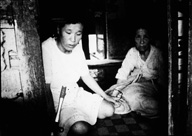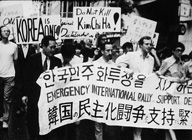Chronicling the Seventies
1 NDU (Nihon Documentarist Union)
NDU was a film collective organized by alumni of Waseda University. Nunokawa Tetsuro armed himself with theory reading film magazines such as Eiga hihyo and Han hakusho. This is an important film that documents zainichi hibakusha living in Korea in the early 1970s.
To the Japs: South Korean A-Bomb Survivors Speak Out
(“Ienomu e: Zaikan hibakusha mukoku no nijuroku nen”)- JAPAN / 1971 / Japanese / Color / 16mm / 52 min
 Staff: Ide Joji, Inoue Osamu, Saito Ren, Nunokawa Tetsuro
Staff: Ide Joji, Inoue Osamu, Saito Ren, Nunokawa Tetsuro
Planning: Takenaka Ro
Production Committee: To the Japs Production and Promotion Committee
Source: NDU, Planet Bibliothèque de Cinéma
In 1971, while the Japanese prime minister Sato Eisaku was visiting South Korea to attend a party for President Park Chung-hee, a group of eight South Korean hibakusha (atomic bomb survivors) took a direct petition to the Japanese embassy. The South Korean hibakusha were detained by South Korean authorities for the duration of the prime minister’s visit. This film follows the lives of these eight people. That same year, Son Chin-tu, a hibakusha who had entered Japan illegally and was being held at the Omura Detention Center, filed his so-called “Hibakusha Certificate Lawsuit,” demanding Japanese residency and medical treatment.
2 Okamoto Yoshihiko
Okamoto Yoshihiko, celebrated for his TV drama I Want to be a Shell (1958), is also known for independently producing films which depict the dark side of Japan-Korea relations. These humanitarian documentaries seek to save a zainichi who was detained in Korea under suspicion of being a spy.
 A Message to the Citizens of the World
A Message to the Citizens of the World
(“Sekai jinmin ni tsugu”)- JAPAN / 1977 / Japanese / Color / 16mm / 92 min
Director, Narrative Structure: Okamoto Yoshihiko
Coodinator: Abiko Ritsuko
Assistant Director: Jinbashi Takenori
Photography: Hirai Yosei
Editing: Shirato Junko, Satsukime Takao
Music: Yun Ei-sang
Narrators: Konoshima Aiko, Nakamura Hideo
Producers: Okamoto Yoshihiko, Abiko Ritsuko
Production Committee: A Message to the Citizens of the World Production Committee, Committee for the National Screening of A Message to the Citizens of the World
Source: Planet Bibliothèque de Cinéma
Korean-born Okamoto Yoshihiko made a film about the issue of zainichi political prisoners in the 1970s. Exploiting anti-communist legislation and manipulating the Korean Central Intelligence Agency (KCIA), the Park Chung-hee military dictatorship made a series of arrests of and imprisoned anti-government activists. Building on his work in Accusation: Report on Zainichi Korean Political Prisoners (1975) focusing on zainichi political prisoners and their families, this documentary expands into such subjects as the Kim Dae-jung Affair.
